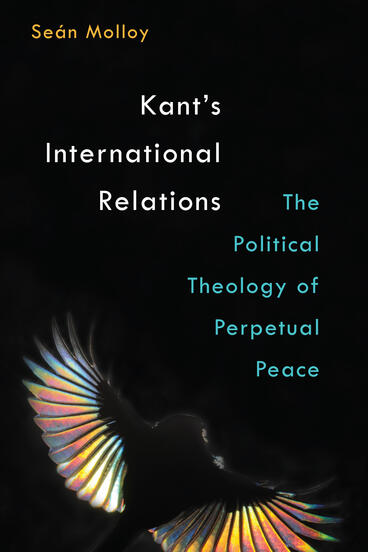Kant's International Relations
The Political Theology of Perpetual Peace
Challenges Kantian International Relations scholars to reassess their relationship with the philosopher and his work
Description
Why does Immanuel Kant (1724–1804) consistently invoke God and Providence in his most prominent texts relating to international politics? In this wide-ranging study, Seán Molloy proposes that texts such as Idea for a Universal History with Cosmopolitan Intent and Toward Perpetual Peace cannot be fully understood without reference to Kant’s wider philosophical projects, and in particular the role that belief in God plays within critical philosophy and Kant’s inquiries into anthropology, politics, and theology. Molloy’s broader view reveals the political-theological dimensions of Kant’s thought as directly related to his attempts to find a new basis for metaphysics in the sacrifice of knowledge to make room for faith.This book is certain to generate controversy. Kant is hailed as “the greatest of all theorists” in the field of International Relations (IR); in particular, he has been acknowledged as the forefather of Cosmopolitanism and Democratic Peace Theory. Yet, Molloy charges that this understanding of Kant is based on misinterpretation, neglect of particular texts, and failure to recognize Kant’s ambivalences and ambiguities. Molloy’s return to Kant’s texts forces devotees of Cosmopolitanism and other ‘Kantian’ schools of thought in IR to critically assess their relationship with their supposed forebear: ultimately, they will be compelled to seek different philosophical origins or to find some way to accommodate the complexity and the decisively nonsecular aspects of Kant’s ideas.
Seán Molloy is Reader in International Relations at the University of Kent.
Reviews
“Molloy’s carefully researched and thoughtful book will be useful for all who wish to understand the place of Kant’s discussions of peace, religion, and history in his thought generally. . . . Recommended.”
—Choice
“Challenges any contemporary political theory that imagines that one can take the part one likes of Kant and ignore the rest.”
—Political Theory
“Kant’s International Relations stands out alone in IR treatments of Kant and has done the discipline an important service. It is both IR and philosophically savvy, bridging philosophy and IR theory in a rigorous manner with a clear and highly pertinent contemporary agenda.”
—Richard Beardsworth, University of Aberystwyth
“Kant, Seán Molloy shows, does not ground hope for peaceful and cosmopolitan politics in human nature - but rather in a political theology with worrying implications. Based on excellent and thorough research and most engagingly written, this book is a must-read for political and international theorists.”
—Beate Jahn, University of Sussex
“Molloy pulls the rug out from underneath the Kantian foundations of liberalism, the Democratic Peace, and cosmopolitanism. He shows the absurdity of using Kant to generate empirically verifiable hypotheses. Instead, he offers a nuanced reading of a complex, ambivalent thinker, and one that stresses the importance of his religious writings.”
—Richard Ned Lebow, King’s College London
“Molloy provides a new reading of Kant for our more troubled times. His sophisticated, wide-ranging and provocative account seeks to reclaim Kant from the liberal cosmopolitans and to emphasize instead the political-theological dimensions of Kant’s understanding of International Relations.”
—Andrew Hurrell, University of Oxford
“Kant remains one of the most influential thinkers about world politics. He is also one of the most misunderstood. Seán Molloy’s penetrating assessment challenges both old and new orthodoxies surrounding Kant’s political vision, and his robust insistence on the theological dimensions of that vision presents fundamental questions for thinking about international politics in theory and in practice. By re-examining the relationship between Kant’s philosophy and his thinking about international politics, this book makes an important contribution to our understanding of both – it deserves wide attention and should generate substantial and important debate.”
—Michael C. Williams, University of Ottawa“Provides an in-depth and careful reading of Kant as a figure who has largely been misinterpreted by theorists of international relations. Molloy demonstrates a familiarity with not only Kant but the secondary literature in both philosophy and political theory.”
—Anthony F. Lang, University of St. Andrews
Winner: British International Studies Association (BISA) 2018 Susan Strange Best Book Prize
- BISA Susan Strange Best Book Prize
Winner: Center for Advanced International Theory (CAIT) 2018 Sussex International Theory Prize
- CAIT Sussex International Theory Prize

